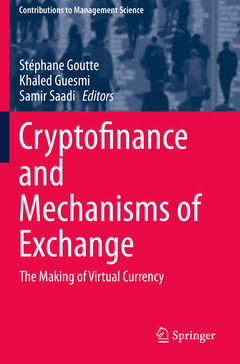Description
Cryptofinance and Mechanisms of Exchange, 1st ed. 2019
The Making of Virtual Currency
Contributions to Management Science Series
Coordinators: Goutte Stéphane, Guesmi Khaled, Saadi Samir
Language: English
Subjects for Cryptofinance and Mechanisms of Exchange:
Publication date: 08-2021
198 p. · 15.5x23.5 cm · Paperback
Publication date: 01-2020
198 p. · 15.5x23.5 cm · Hardback
Description
/li>Contents
/li>Biography
/li>Comment
/li>
DR. Khaled Guesmi is a full Professor of Finance at Paris School of Business and adjunct professor at Telfer School of Management, University of Canada. He undertakes research and lectures on empirical finance, applied time-series econometrics, and commodity markets. Dr. Guesmi obtains his HDR (Habilitation for Supervising Doctoral Research) in in July 2015. He holds his Ph.D. in Economics from the University Paris Nanterre in 2011, and his M.Sc. in Finance from Paris I University of Sorbonne in 2005. Previously, he served as Professor of Finance and Head of Environment, Climate Change and Energy Transition Chair at IPAG Business School, as associate research positions at “EconomiX” laboratory at the University of Paris Ouest La Défense and "ERF" Economic Research Forum, Egypt. In 2003 Dr. Guesmi joined the UNESCO as a Research Manager, and in 2008, he joined “Caisse de Dépôts et Consignations” as Financial Analyst.
He has published articles in leading refereed journals, including the Energy Journal; International Review of Financial Analysis; Journal of International Financial Markets, Institutions & Money, Annals of Operations Research, Energy Economics and Energy Policy. Furthermore, Dr. Guesmi currently serves as Associate Editor at Finance Research Letters, as international advisory board at The International Spectator. In addition, Khaled Guesmi is the founder of the International Symposium on Energy and Finance Issues and the Project Manager of European Commission’s Horizon 2020 Program for Research and Innovation. Dr. Khaled Guesmi hold the 4th best world researcher in Energy Finance: Frontiers and Future Development in Beijing in 2018.
Stéphane Goutte has two PhDs, one in Mathematics and one in Economics. He got his Habilitation for Supervising Scientific Research (HDR) in 2017 at University Paris Dauphine. He is Associate Profes
Comprehensively analyzes the making of virtual currencies, including investment and governance issues and future trends
Provides an in-depth mathematical development of several aspects of virtual currencies such as modelling volatility and modelling the demand for virtual currencies
Combines qualitative and quantitative discussions about virtual currencies
Provides the latest developments and trends on three important axes/aspects involving virtual currencies and Blockchain technology: Investment, Legal and Future trends and prospects
To reinforce key concepts, each chapter ends with a list of discussion questions and a brief discussion of main lessons learned




